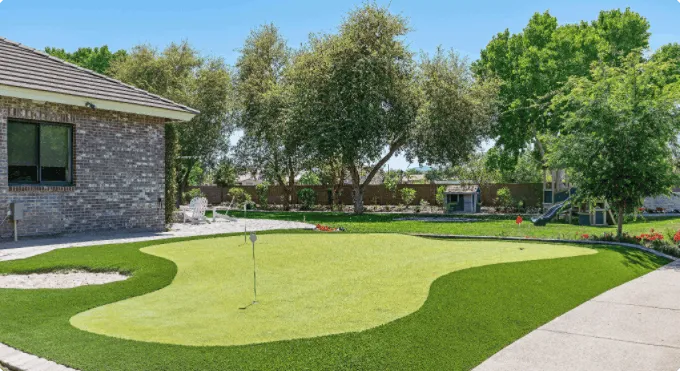
- Afrikaans
- Arabic
- Belarusian
- Bengali
- Czech
- Danish
- Dutch
- English
- Esperanto
- Estonian
- Finnish
- French
- German
- Greek
- Hindi
- Hungarian
- Icelandic
- Indonesian
- irish
- Italian
- Japanese
- kazakh
- Rwandese
- Korean
- Kyrgyz
- Lao
- Latin
- Latvian
- Malay
- Mongolian
- Myanmar
- Norwegian
- Persian
- Polish
- Portuguese
- Romanian
- Russian
- Serbian
- Spanish
- Swedish
- Tagalog
- Tajik
- Thai
- Turkish
- Turkmen
- Ukrainian
- Urdu
- Uighur
- Uzbek
- Vietnamese
laying artificial grass on paving slabs
Dec . 04, 2024 16:16 Back to list
Laying Artificial Grass on Paving Slabs A Practical Guide
Artificial grass has become a popular solution for homeowners and businesses alike, offering a lush, green appearance without the hassle of maintaining natural lawns. One of the most practical methods of installation involves laying artificial grass over existing paving slabs. This approach not only revitalizes outdoor spaces but also provides an easy way to enjoy a verdant landscape without uprooting old surfaces. This article will guide you through the process of laying artificial grass on paving slabs.
Step 1 Assess the Area
Before you begin, assess the area where you plan to install the artificial grass. Look for any damage on the paving slabs that may need addressing. Uneven surfaces can create drainage issues and lead to problems down the line. Clean the area thoroughly, removing any debris, dirt, or weeds that may undermine your installation.
Step 2 Choose the Right Materials
Selecting high-quality artificial grass is crucial for achieving a realistic look and ensuring longevity. Opt for a product that is UV-resistant, durable, and has a natural appearance. In addition to the grass, you will need sand, adhesive (if required), and a suitable infill material to enhance the grass's stability and durability.
Step 3 Prepare the Surface
The next step involves preparing the surface of the paving slabs. Since these surfaces are typically hard and non-porous, efficient drainage will be paramount to avoid water pooling on top of the grass. If the slabs are uneven, consider using a self-leveling compound to create a flat surface. It is also advisable to apply a weed barrier fabric under the artificial grass to prevent any growth from below.
Step 4 Laying the Artificial Grass
laying artificial grass on paving slabs

Once the surface is prepared, it’s time to lay the artificial grass. Begin by rolling out the grass over the paved area, allowing for a slight overlap where pieces meet. Ensure that the grass fibers are all pointing in the same direction for an even appearance. Trim any excess grass using a sharp utility knife, being careful not to cut too deeply into the backing material.
Step 5 Securing the Grass
To secure the grass in place, you can use a strong adhesive designed for outdoor installations. Apply the adhesive along the edges and seams, ensuring that the grass lies flat against the paving slabs without any bubbles or wrinkles. For added stability, you might also anchor the grass with landscape staples or similar fasteners, especially in high-traffic areas.
Step 6 Adding Infill Material
Infill material plays a pivotal role in maintaining the shape and lifespan of artificial grass. Spread an appropriate infill, such as silica sand or rubber granules, evenly over the grass surface. This step not only adds weight to keep the grass in place but also supports the upright fibers and enhances the appearance of the lawn.
Step 7 Final Touches
After the installation, take a moment to brush the grass fibers against the grain. This technique helps to ensure an upright appearance. Water the grass lightly to settle the infill, and check for any areas that may need re-adjustment.
Conclusion
Laying artificial grass on paving slabs is a straightforward way to transform outdoor spaces into lush, green havens. With careful planning, appropriate materials, and a bit of effort, homeowners can achieve a beautiful lawn that requires minimal maintenance. By following these outlined steps, you can enjoy the benefits of artificial grass while enhancing the aesthetics of your environment.
-
The Benefits of Artificial Turf for Indoors
NewsJul.15,2025
-
How Artificial Grass Suppliers Ensure Quality Products
NewsJul.15,2025
-
Artificial Grass and Pets: A Space for Relaxation
NewsJul.08,2025
-
Balcony & Outdoor Decoration with Artificial Grass
NewsJul.08,2025
-
Best Indoor Artificial Grass for Home
NewsJul.07,2025
-
Best Pet Turf for Dogs: Safe & Durable Artificial Grass Options
NewsJul.07,2025
Products categories









